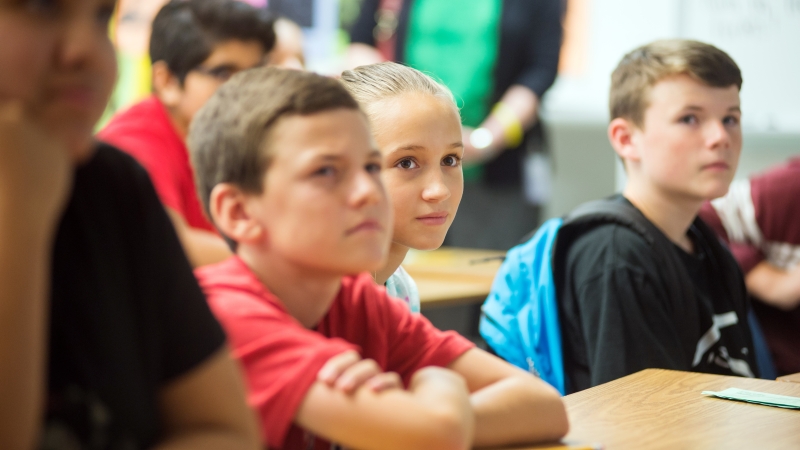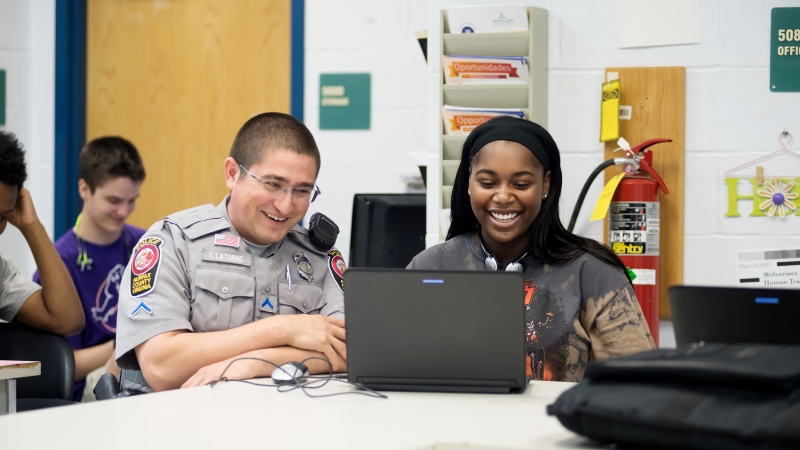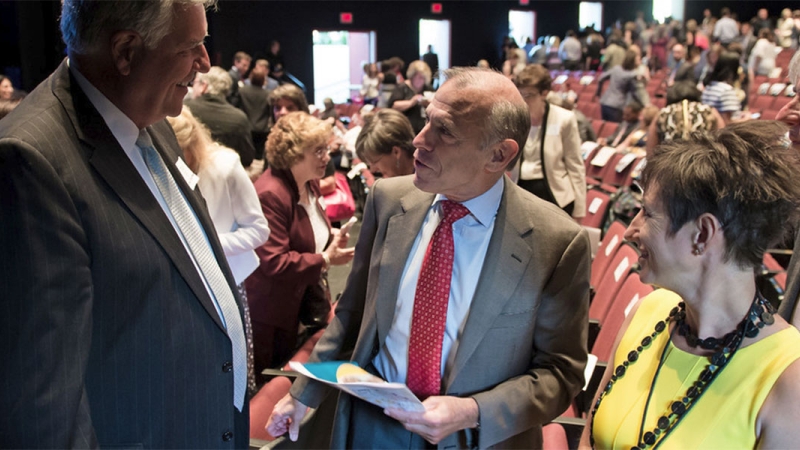
Social Media Guidance for Staff
Non-Instructional Use
In addition to the following guidance, FCPS employees should review Regulation 7004, Management of FCPS External Communications, which lists the requirements and responsibilities for staff using social media professionally or on behalf of their school, department, office, classroom, or any other FCPS entity.

Social media plays a powerful role in communicating and engaging with parents, students, staff, and members of the community. Our students are “growing up digital,” with social media being an essential part of their lives. As FCPS employees, modeling appropriate behavior in the social space will help guide our students on the path to becoming good digital citizens. It will also help prevent any misunderstandings that could affect us personally and/or professionally.
Social media describes online technologies and platforms that enable individuals to share information, opinions, experiences, and perspectives with each other. Examples include Twitter, Facebook, Instagram, and YouTube. This document addresses social media used by staff ONLY in a non-instructional capacity, such as communicating with parents and other stakeholders about important news and updates, classroom activities, events, achievements, and other items of interest. Many of our employees do an amazing job of using social media to showcase creativity, collaboration, and learning at its best. As a result, the excellence within #OurFCPS becomes available for all to see.
Guiding Principles
The values, professionalism, and confidentiality that employees are expected to adhere to in their daily work environment should also apply online. Bring your best self to social media just as you do in your classroom or office.
FCPS’ expectations for employee use of social media are based on the three principles below. Understanding these concepts will empower you to make smart choices and feel confident about your online interactions.
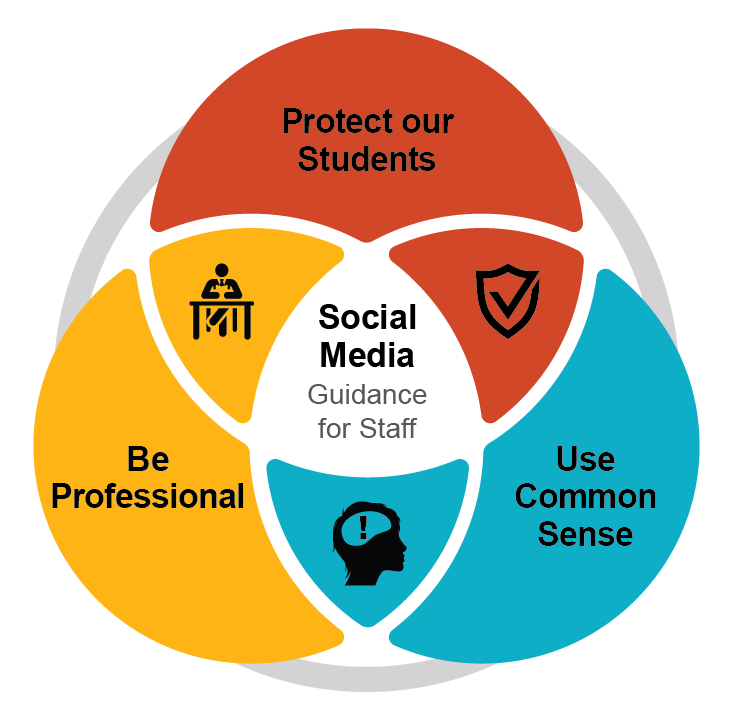
1) Protect our students.
The safety and well-being of our students is our primary concern. FCPS has the same obligation to protect student privacy online as it does offline. Please review the following prior to posting photos and videos of, or information about, your students on social media:
Opt-Out Forms
- The Family Educational Rights and Privacy Act (FERPA) permits the disclosure of “directory information” from a student’s record without the parent’s prior written consent, unless the parent has opted out of such disclosure. Directory information includes, but is not limited to, the student’s name—we recommend using first names only when posting on social media—school name, photos, and awards.
- If a parent has submitted a signed Opt-Out Form noting the Comprehensive Opt-Out Option or Choice C, you may not disclose photos nor videos of the student in social media without the parent’s written consent. Students over age 18 may sign their own Opt-Out Form. See FCPS' Opt-Out Forms Packet for complete details.
- Student Work
- Student work—drawings, artwork, presentations—may be considered part of a student’s education record.
- Student handwriting is considered a “biometric” record that is considered personally identifiable student information.
- Parent or guardian permission must be obtained prior to posting any student work on social media, because it is not defined as exempt directory information that can be released without consent. Learn more about FERPA.
Notify Parents of Classroom Social Media Accounts
If teachers plan to feature students on their FCPS social media account, i.e, @MsJonesClass, they should let parents know in advance. Any concerns about a student being featured in social media posts, whether from a parent or student, must be respected. Also, be sure you are not inadvertently disclosing personally identifiable information about a student on social media:
- Cover name tags, names labeled on a laptop, or other identifiers that may be in the background.
- During distance learning, teachers often take photos of their students as they appear on screen, within a virtual learning platform. In addition to making sure none of the students visible on screen have a signed opt-out form on file, remove last names that may appear with each student’s image.
- Please obtain parent permission prior to disclosing any photos or videos featuring students in special education or other programs which parents may want to keep private.
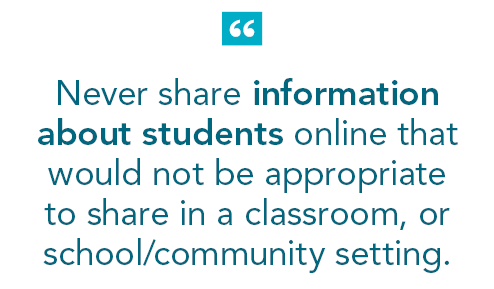
2) Be professional.
There are numerous benefits to engaging in social media, but we all need to be aware of potential pitfalls. Maintaining professional boundaries is one way to avoid them.
As always, please use particular care where our students are concerned. You must always maintain a professional relationship with students. Private, one-on-one online or electronic communication with students that are unrelated to school activities or any conduct that violates the law is prohibited, and may be grounds for discipline up to, and including, dismissal. (See 4444.1 Prevention of Sexual Misconduct and Abuse.)
We recommend you avoid issuing or accepting requests from students or parents to friend or follow them. (They can follow you, if they choose.) Though it may seem harmless to retweet, like, favorite, tag, or engage with student posts in other ways, doing so can be misinterpreted. Establishing personal connections with parents may lead to the appearance of favoritism being shown to their student.
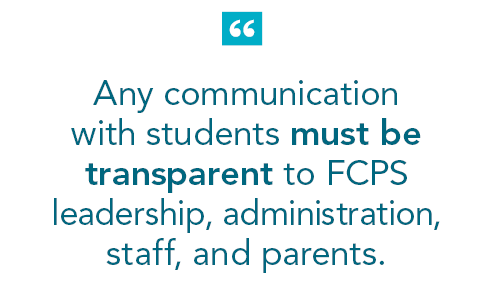
In addition to your actions remaining professional, it’s best to keep your tone professional in social media as well. Stay positive. Don’t get involved in negative or critical conversations, especially ones that involve students. If it’s an issue that needs to be addressed, politely offer to take the conversation offline. Consider reading your tweet aloud or have a colleague read it before you post it. Whatever you do, be respectful—even if someone is not returning the favor.
For educators in particular, we recommend keeping your professional and personal social media accounts separate. If you choose to post personal content on your professional account, remember that personal views, behavior, and interests may influence how you are perceived professionally. Photos and videos of students can never be shared on personal social media accounts.
3) Use common sense.
For better or worse, what you say or show on social media becomes part of your digital footprint. While your posts may intend no harm, the wrong one can put you in the center of controversy. As an FCPS employee, your posts—whether personal or professional—reflect not only upon you, but also upon the school division. The content of your posts should not impair your capacity to maintain the respect of students and parents, nor impair your ability to effectively perform your job. Any action that brings the school system into disrepute may be just cause for dismissal. (See Regulation 4293.6 Dismissal—Definition of Just Cause.)
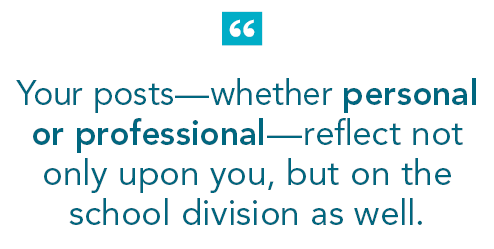
Posting any content related to alcohol, tobacco, and/or illegal substances is not permitted on FCPS-related social media accounts unless it is for approved safety and wellness education purposes. Other content to avoid includes obscene, defamatory, discriminatory, harassing, violent, vulgar, or sexual material, or material that advocates the commission of a criminal act, violates FCPS policy, or that reasonably may lead to the substantial disruption of or material interference with school system operations. Think twice before posting that type of content on your private social media accounts, too. They still reflect upon your role as an FCPS employee. For guidance around campaigning, visit the policies on the FCPS Employee Hub.
Please remember that the internet doesn’t forget. Your posts may be available to the world for years to come. Establishing appropriate privacy settings to limit access to personal information on your social media account(s) is a good idea. But that’s no guarantee that the photo you send on your private Facebook account won’t end up being shared by one of your friends. Before posting, ask yourself if you would want your significant other, grandparent, or the superintendent to see it. If not, don’t post it.
Examples

This document is meant to provide general guidance and does not cover every potential social media situation. Employees will be held responsible for the disclosure, whether purposeful or inadvertent, of confidential or private information, information that violates the privacy rights or other rights of a third party, or the content of anything they post on any social media platform. This guidance is intended to supplement, not supersede, existing law, and FCPS policies and regulations. All existing laws, and FCPS policies and regulations that cover employee conduct may be applicable in the social media environment. Supervisors should consult with Human Resources and/or Division Counsel before taking employment action on the basis of personal speech.
Questions? Please contact the Office of Communication and Community Relations at [email protected] or 571-423-1200.
Additional Resources
- 4293.6 Dismissal—Definition of Just Cause
- 4429 Conduct and Discipline—Support Employees
- 4444.1 Prevention of Sexual Misconduct and Abuse
- 4950 Sexual Harassment
- 6225 FCPS Information Security Policy
- 6410 Appropriate Use of Fairfax County Public Schools' Network and Internet
- 7004 Management of Fairfax County Public School's External Communications
- How to Create FCPS Social Media Accounts (Located on FCPS employee website: Employee Hub. Note: Employees use their network ID and password to log in to the Hub.)
Updated: May 6, 2021

